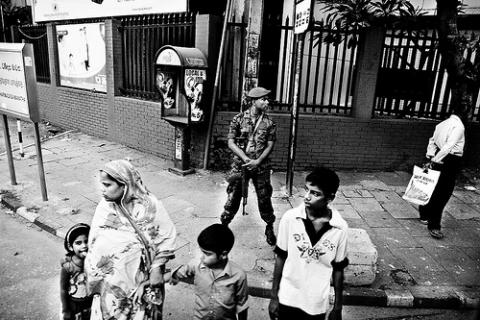In Sri Lanka, free only to say what power wants to hear

On World Press Freedom Day, we should be grateful for our licence,taken for granted, to say what we think. In Sri Lanka, it's not the case. Angela Long attends a thought-provoking lecture
A free press is something we enjoy in Ireland. According to world surveys, the Irish media is luxuriously unfettered by global standards. You might not be conscious of it, but robust criticism of government policies and personalities, the uncomplimentary analysis of Vincent Browne and others, is something that could not happen, unmolested, in many countries.
One of these is Sri Lanka, where the government cracks down savagely on any publisher or broadcaster who dares to question the orthodoxy. For World Press Freedom Day, May 3, the Press Council of Ireland hosted a lecture by Lal Wickrematunge. He is the publisher of a weekly investigative newspaper, The Sunday Leader. He is also the brother of a fearless journalist, Lasantha Wickrematunge, who was murdered in 2009 after repeatedly questioning the behaviour and background of the country’s presidents.
Mr Wickrematunge, a soft-spoken 60-year-old, tells his story simply, without melodramatics. He describes the political situation in Sri Lanka, and acknowledges the raw legacy of the years of conflict between the Liberation Tigers of Tamil Eelam (LTTE), fighting for the Tamil minority, and the majority Sinhalese population.
To summarise, the infamous conflict ran from the emergence of the LTTE, under ethnic provocation, in the late 1970s, until an official ceasefire in 2002. But the conflict, horribly bloody, did not really end until the army had fenced the Tigers and their leader, Velupillai Prabhakaran, into a trap in May 2009.
Last week, the United Nations released a report on ‘accountability’ in Sri Lanka. The soft title hid a finding that tens of thousands of deaths in the government’s war against the LTTE could be classified as war crimes. An estimated 100,000 Tamils died during the 30 years of war, as well as thousands on the ‘other’ side.
Against this background, according to Lal Wickrematunge, the official organs of state were crafted into impenetrable fortresses. Cronyism and nepotism are rife. Out of a parliament of 225 representatives, about half (110) are in the Cabinet. The scale of appointment of advisers, staff and hangers-on dwarfs Irish excesses during the height of the programme-managers-and-garda-drivers era.
But, much more sinister is the lack of accountability, the untouchable nature of those in power. It was this, Wickrematunge makes clear, that his newspaper tried to challenge and expose. As an example, his brother investigated the educational claims made by a former, female, president, and exposed them as false. On other occasions, he revealed unsavoury details of ruthless government operations against the Tigers. For this “ our presses were attacked and set on fire, by men dressed in black.” Lal Wickrematunge calmly cleaned up and took the offending edition to another press, and continued the print run.
Of course, the men in black returned, and several times they came for his brother, Lasantha, a brilliant journalist and the editor-in-chief of The Sunday Leader. Once, after his right arm was broken by thugs who ambushed him, beat him, and jumped on the arm till it broke, Lasantha could still smile from his hospital bed: “They thought I was right-handed.”
Without any strong support in a compliant and cowed media, The Sunday Leader, and Lasantha, remained targets. In January, 2009, the thugs followed Lasantha to work.
“There were three calls made from his mobile phone during that journey,” Lal Wickrematunge told the Press Council audience. “One to his office, one to his family, and one to the president of Sri Lanka. The president would not take the call – we are told that he asked only ‘was it in the head?’ when an aide mentioned Lasantha.”
Lasantha, in other calls, said he was being followed by a black vehicle. Apparently, this overtook him, forced him to stop, and he was shot dead.
Now, Sri Lanka’s defence minister, Gotabaya Rajapaksa – and brother of the current president – is suing the newspaper for 2 billion rupees (around €12.4 million). This ludicrous sum is more than the company could ever pay.
Asked if there is no sector of bloggers, citizen journalists and dissidents reporting abuses on the internet from his homeland, Wickrematunge says, a little sadly, that people are too scared – but also, in a way, content with their lot. “In this country, you just eat a mango that falls from the tree; it is always summer. People are not hungry, so they are not on the streets like in Iran,” he said.
But he pleaded for help and engagement from the international community: it is interest from the outside world which is the only thing that stops the regime from a total, final solution.
To read ‘And Then They Came for Me’, an article written by Lasantha Wickrematunge before his death, follow this link…http://www.thesundayleader.lk/archive/20090111/editorial-.htm
